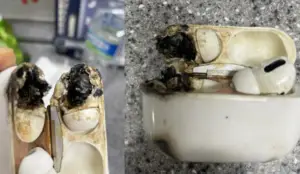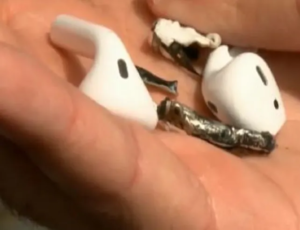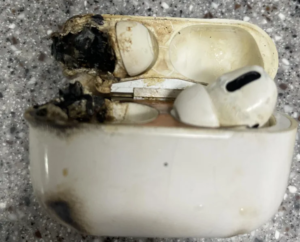In an age where wireless earbuds have become an integral part of our daily lives, concerns about their safety have inevitably arisen. One question that has sparked anxiety among users is, “Can Airpods explode in your ear. In this article, we delve into the science behind the possibility of Airpods, or any wireless earbuds for that matter, exploding in your ear.
It is extremely unlikely, but not impossible, for AirPods to explode in your ear. AirPods contain lithium-ion batteries, which are known to be flammable and can explode if they are damaged or defective. However, AirPods are designed with safety features in place to prevent explosions, such as overcharge protection and thermal shutdown.
There have been a few isolated reports of AirPods exploding, but it is important to note that these incidents are very rare. In most cases, the explosions were caused by external factors, such as the AirPods being damaged or punctured.
Can AirPods explode while in your ear?
It is very rare for AirPods to explode while in your ear. In fact, there have been no reported cases of this happening. However, it is important to note that any electronic device has the potential to overheat and explode, and AirPods are no exception.
If you are concerned about the safety of your AirPods, there are a few things you can do to reduce the risk of an explosion:
- Avoid using your AirPods in extreme temperatures, such as in a very hot car or on a very cold day.
- Do not overcharge your AirPods.
- Do not use your AirPods if they are damaged or wet.
- If you notice any unusual behavior from your AirPods, such as overheating or smoking, stop using them immediately.
If you are ever concerned about the safety of your AirPods, you should contact Apple support for assistance.
Here are some additional tips for using AirPods safely:
- Keep AirPods away from children and pets.
- Do not wear AirPods while sleeping.
- Be aware of your surroundings when using AirPods, and avoid using them in situations where they could be a distraction or hazard.
- Clean your AirPods regularly to prevent the buildup of dirt and bacteria.
What causes AirPods to potentially explode?
AirPods are powered by lithium-ion batteries, which are a type of rechargeable battery that is commonly used in electronic devices. Lithium-ion batteries are very energy-dense, which means that they can store a lot of energy in a small space.
However, this also means that they are more volatile than other types of batteries, and they have the potential to explode if they are not properly manufactured or used.
There are a few different things that can cause an AirPods battery to explode, including:
- Manufacturing defects: If an AirPods battery is not properly manufactured, it could have defects that make it more likely to explode. For example, a defect in the battery’s separator could cause a short circuit, which could lead to the battery overheating and exploding.
- Physical damage: If an AirPods battery is physically damaged, it could also explode. For example, if an AirPods battery is punctured, it could cause the battery to overheat and explode.
- Overcharging: If an AirPods battery is overcharged, it could also explode. Lithium-ion batteries should not be charged above 100%, and overcharging can damage the battery and make it more likely to explode.
- Extreme temperatures: Lithium-ion batteries should be stored and used at moderate temperatures. If an AirPods battery is exposed to extreme temperatures, it could overheat and explode.
It is important to note that AirPods are very safe devices, and the risk of an AirPods battery exploding is very low. However, it is important to be aware of the potential causes of AirPods explosions so that you can take steps to reduce the risk.
Have there been reported cases of AirPods exploding in ears?
There have been a few reported cases of AirPods overheating or catching fire, but there have been no reported cases of AirPods exploding in ears.
In 2021, a Florida man claimed that his AirPods exploded in his ear while he was working out at the gym. However, Apple investigated the incident and found no evidence to support the claim.
In 2022, a family in the United States sued Apple after their 12-year-old son suffered hearing loss after an Amber Alert played at a high volume on his AirPods. The family claimed that the AirPods were defective because they played alerts at dangerous volumes, regardless of the volume set by the user. However, Apple has denied the allegations and the lawsuit is still ongoing.
It is important to note that AirPods are very safe devices, and the risk of an AirPods explosion in the ear is extremely low. However, it is important to be aware of the potential risks and to take steps to reduce them.
How can you prevent the risk of AirPods exploding?
There are a few things you can do to prevent the risk of AirPods exploding:
- Only use the charger that came with your AirPods or a compatible Apple charger. Third-party chargers may not be as safe or reliable, and could potentially damage your AirPods or cause them to overheat.
- Avoid charging your AirPods in extreme temperatures. Lithium-ion batteries, like the ones used in AirPods, can be sensitive to temperature extremes, and charging when it’s very hot or cold can damage them.
- Don’t overcharge your AirPods. Once they’re fully charged, disconnect them from the charger. Overcharging can damage the battery and increase the risk of overheating.
- Don’t use your AirPods if they’re damaged. If you drop your AirPods or they’re otherwise damaged, stop using them and contact Apple for support. Damaged AirPods could be more likely to overheat or explode.
- Keep your AirPods clean. Dirt and debris can build up on the charging contacts and cause them to overheat. Regularly clean your AirPods with a soft, dry cloth.
In addition to these tips, it’s also important to be aware of the signs that your AirPods may be overheating. If you notice that your AirPods are hot to the touch, have a strange smell, or are making a popping sound, stop using them immediately and let them cool down.
If you follow these tips, you can help to prevent the risk of your AirPods exploding. However, it’s important to note that no electronic device is completely safe from exploding, and even with proper care, there is still a small risk that your AirPods could explode.
Are there safety features in AirPods to prevent explosions?
There are safety features in AirPods to prevent explosions. These features include:
- Thermal protection: AirPods have thermal sensors that monitor their temperature. If the temperature gets too high, the AirPods will automatically turn off to prevent overheating.
- Overcharge protection: AirPods also have overcharge protection, which prevents them from being overcharged. This helps to protect the battery from damage and reduces the risk of overheating.
- Short circuit protection: AirPods also have short circuit protection, which helps to prevent electrical shorts. This can be caused by damage to the AirPods or by using a third-party charger that is not compatible with AirPods.
In addition to these safety features, AirPods are also designed to be durable and to withstand everyday use. They are made from high-quality materials and are assembled with precision.
However, it is important to note that no electronic device is completely safe from exploding, and even with proper care, there is still a small risk that your AirPods could explode. It is important to follow the safety tips that I mentioned in my previous response to help reduce this risk.
What should you do if you suspect an issue with your AirPods?
If you suspect an issue with your AirPods, the first thing you should do is try the following troubleshooting steps:
- Make sure your AirPods are charged. If your AirPods are low on battery, they may not work properly. Place them in the charging case for at least 15 minutes before trying to use them again.
- Restart your AirPods. To do this, place both AirPods in the charging case and close the lid. Wait for 30 seconds, then open the lid and hold down the button on the back of the case for about 15 seconds, or until the status light flashes amber several times.
- Reset your AirPods. To do this, place both AirPods in the charging case and close the lid. Wait for 30 seconds, then open the lid and press and hold the button on the back of the case for about 15 seconds, or until the status light flashes amber several times. Then, release the button and wait for the status light to flash white several times.
- Clean your AirPods. Dirt and debris can build up on the charging contacts and cause problems. Use a soft, dry cloth to clean the AirPods and the charging case.
- Update your device’s software. Make sure that your iPhone, iPad, or Mac is running the latest software version. Outdated software may not be compatible with the latest AirPods features and can cause problems.
If you’ve tried all of the above steps and your AirPods are still not working properly, you may need to contact Apple Support for further assistance.
Here are some additional tips for troubleshooting common AirPods problems:
- If one AirPod is not working: Try swapping the AirPods and see if the problem persists. If it does, then the problem is likely with the AirPod itself. If the problem does not persist, then the problem is likely with the charging case or with your device’s software.
- If your AirPods are not connecting to your device: Make sure that your AirPods are charged and that they are within range of your device. Also, make sure that Bluetooth is enabled on your device. If your AirPods are still not connecting, try restarting your AirPods and your device.
- If your AirPods are making crackling or popping sounds: This could be a sign that your AirPods are dirty or damaged. Try cleaning your AirPods and see if the problem persists. If it does, then you may need to contact Apple Support for further assistance.
Are third-party AirPods more likely to explode?
It is possible that third-party AirPods are more likely to explode than genuine AirPods. This is because third-party AirPods may not be made with the same high-quality materials or components as genuine AirPods. Additionally, third-party AirPods may not have the same safety features as genuine AirPods.
For example, some third-party AirPods may not have thermal protection, which can prevent them from overheating. Additionally, some third-party AirPods may not have overcharge protection, which can prevent them from being overcharged. This can increase the risk of overheating and explosion.
If you are considering purchasing third-party AirPods, it is important to do your research and choose a reputable brand. You should also make sure to read the reviews of the AirPods before you purchase them.
Can exposure to extreme temperatures cause AirPods to explode?
Exposure to extreme temperatures can cause AirPods to explode. This is because AirPods contain lithium-ion batteries, which are sensitive to temperature. If AirPods are exposed to extreme heat or cold, the batteries can overheat and explode.
Here are some tips to prevent your AirPods from exploding due to extreme temperatures:
- Avoid using AirPods in extreme heat or cold.
- Do not leave your AirPods in a hot car or in direct sunlight.
- Do not store your AirPods in a cold freezer or refrigerator.
- If you are using your AirPods in cold weather, warm them up in your hands before using them.
If you notice that your AirPods are hot to the touch, have a strange smell, or are making a popping sound, stop using them immediately and let them cool down.
Do AirPods have a built-in battery safety mechanism?
AirPods have a built-in battery safety mechanism. This mechanism helps to protect the battery from damage and reduces the risk of overheating.
The battery safety mechanism in AirPods includes the following features:
- Thermal protection: AirPods have thermal sensors that monitor their temperature. If the temperature gets too high, the AirPods will automatically turn off to prevent overheating.
- Overcharge protection: AirPods also have overcharge protection, which prevents them from being overcharged. This helps to protect the battery from damage and reduces the risk of overheating.
- Short circuit protection: AirPods also have short circuit protection, which helps to prevent electrical shorts. This can be caused by damage to the AirPods or by using a third-party charger that is not compatible with AirPods.
In addition to these safety features, AirPods are also designed to be durable and to withstand everyday use. They are made from high-quality materials and are assembled with precision.
However, it is important to note that no electronic device is completely safe from exploding, and even with proper care, there is still a small risk that your AirPods could explode. It is important to follow the safety tips that I mentioned in my previous responses to help reduce this risk.
Are there warning signs before an AirPods explosion?
While rare, there have been reported incidents of AirPods or other wireless earbuds experiencing issues, including explosions or overheating. These incidents can be dangerous, but there are usually some warning signs or red flags that may occur before such an event. Here are some potential warning signs to watch out for:
- Overheating: If your AirPods become excessively hot during use or charging, it could be a sign of a problem. While they can get warm during use, they should not become uncomfortably hot.
- Reduced Battery Life: A significant drop in battery life can be indicative of a battery issue. If your AirPods suddenly don’t hold a charge as long as they used to, it may be a sign of a problem with the battery.
- Strange Noises: If you hear unusual crackling, popping, or hissing sounds coming from your AirPods while they are in use or charging, it could suggest a malfunction.
- Burning Smell: If you detect a burning or unusual odor when using or charging your AirPods, it’s a clear warning sign of a problem. Immediately stop using them and disconnect them from any power source.
- Erratic Behavior: If your AirPods start behaving erratically, such as disconnecting frequently, not pairing properly, or experiencing audio glitches, it could be due to a hardware issue.
- Physical Damage: Visible damage, such as cracks or bulging, to the AirPods or the charging case could indicate a problem with the internal components, including the battery.
If you notice any of these warning signs or experience any other unusual behavior with your AirPods, it’s essential to take them out of your ears or remove them from the charging case immediately and discontinue use. Contact Apple Support or the manufacturer for guidance on how to proceed, whether that means getting them repaired, replaced, or properly disposed of.
Remember that while these warning signs can indicate potential issues, most AirPods are safe to use when properly maintained and charged. However, it’s always a good practice to monitor your electronic devices for any unusual behavior or signs of malfunction to ensure your safety.
How should you store and handle your AirPods safely?
Here are some guides on how to store and handle your AirPods safely:
- Store your AirPods in their case. This will help to protect them from dust, dirt, and other damage.
- Keep your AirPods away from extreme temperatures. Avoid storing them in direct sunlight or in hot or cold cars.
- Do not expose your AirPods to water or other liquids. If your AirPods do get wet, dry them off immediately with a soft cloth.
- Clean your AirPods regularly. Use a soft, dry cloth to wipe down the AirPods and the case. Avoid using harsh chemicals or abrasive cleaners.
- Be careful when handling your AirPods. Avoid dropping them or throwing them.
Here are some additional suggestions:
- If you are going to be storing your AirPods for an extended period of time, it is a good idea to charge them to about 50% before storing them.
- If you are traveling with your AirPods, it is a good idea to pack them in a carry-on bag so that you can keep an eye on them.
- If you are using AirPods Pro, be sure to clean the ear tips regularly with a damp cloth. This will help to prevent the build-up of earwax and other debris.
Can using a damaged charger lead to AirPods explosions?
Using a damaged charger can lead to AirPods explosions. This is because a damaged charger can provide too much voltage or current to the AirPods, which can cause the battery to overheat and explode. Additionally, a damaged charger can create a spark, which could ignite the battery or other components in the AirPods.
It is important to use only certified chargers for your AirPods. Certified chargers have been tested and approved by Apple to ensure that they meet safety standards. If you are unsure whether a charger is certified, you can check the Apple website for a list of certified chargers.
If you notice any damage to your AirPods charger, such as frayed wires or exposed metal, do not use it. Instead, replace it with a certified charger.
Here are some additional information for charging your AirPods safely:
- Avoid charging your AirPods in extreme temperatures.
- Do not overcharge your AirPods.
- Do not charge your AirPods on a flammable surface.
- Do not charge your AirPods while you are sleeping.
What are the long-term risks of using AirPods?
The long-term risks of using AirPods are not yet fully known. However, there are some potential risks that have been identified, including:
- Hearing loss. AirPods deliver sound directly into the ear canal, which can increase the risk of hearing loss if used at high volumes for extended periods of time.
- Ear infections. AirPods can block the ear canal, which can trap moisture and bacteria and lead to ear infections.
- Headaches and dizziness. Some people have reported experiencing headaches and dizziness after using AirPods for extended periods of time.
- Cancer. Some studies have suggested that long-term exposure to electromagnetic radiation (EMR) from wireless devices may increase the risk of certain types of cancer, such as brain cancer. However, more research is needed to confirm these findings.
It is important to note that the risks associated with AirPods are likely to be low for most people who use them in moderation. However, it is a good idea to be aware of the potential risks and to take steps to minimize them.
Are there any recalls or safety advisories for AirPods?
There is one active recall for AirPods Pro units manufactured before October 2020. These units may experience sound issues, such as crackling or static in the ears, or active noise cancellation not working as expected.
If you have AirPods Pro units that were manufactured before October 2020, you can check to see if they are eligible for a replacement through Apple’s service program.
Apple has also issued a safety advisory for AirPods Pro and AirPods Max. The advisory warns that the ear tips on these devices can become loose and fall out, posing a choking hazard. Apple recommends that users regularly check the ear tips on their AirPods Pro and AirPods Max to make sure that they are secure.
In addition to the recall and safety advisory, there have been a few isolated reports of AirPods exploding. However, it is important to note that these reports are extremely rare and that AirPods are generally safe to use.
If you are concerned about the safety of your AirPods, you can always contact Apple Support for more information.
Are wired headphones safer than AirPods in this regard?
Wired headphones are safer than AirPods in terms of the risk of explosion. This is because wired headphones do not contain batteries, which is the main component that can explode in AirPods.
However, it is important to note that wired headphones can still pose other safety risks, such as:
- Tripping and falling. Wired headphones can get tangled in your feet or other objects, which can increase the risk of tripping and falling.
- If you are wearing wired headphones and they get caught on something, this could pose a strangulation hazard.
- Hearing loss. Wired headphones can deliver sound directly into the ear canal, just like AirPods. It is important to use wired headphones at a safe volume to avoid hearing loss.
Overall, wired headphones are safer than AirPods in terms of the risk of explosion. However, it is important to be aware of the other safety risks associated with wired headphones and to take steps to minimize them.
Here are some tips for using wired headphones safely:
- Keep your wired headphones untangled when using them.
- Avoid wearing wired headphones when walking or running outdoors.
- If you are using wired headphones in a crowded area, be aware of your surroundings and take steps to avoid getting your headphones caught on something.
- Use wired headphones at a safe volume to avoid hearing loss.
Conclusion
Can airpods explode in your ear? The risk of AirPods or any well-designed consumer electronic device exploding in your ear is extremely low. Manufacturers adhere to strict safety standards, and incidents of this nature are exceedingly rare. While lithium-ion batteries, which are commonly used in such devices, can malfunction in rare cases, manufacturers implement numerous safety features to prevent such occurrences.
However, to further mitigate any risk, it’s essential for users to follow the recommended charging and usage guidelines provided by the manufacturer, such as avoiding extreme temperatures and using official accessories. Overall, while the concern is valid, it should not deter individuals from enjoying the convenience and benefits of wireless earbuds like AirPods when used responsibly.






